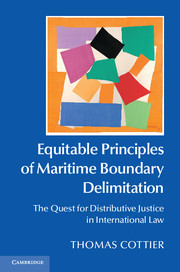 Equitable Principles of Maritime Boundary Delimitation
Equitable Principles of Maritime Boundary Delimitation Book contents
- Frontmatter
- Dedication
- Contents
- List of tables
- List of maps
- Preface
- Acknowledgements
- Table of cases
- Table of treaties and instruments
- Equity revisited: an introduction
- PART I Context: the enclosure of the seas
- PART II The new boundaries
- PART III Delimitation based on equity
- 8 The rule of equity
- 9 Conceptual issues and the context of equity
- 10 Justiciable standards of equity
- 11 The methodology of judicial boundary delimitation
- 12 The role of equity in negotiations
- Appendix I Maritime boundary agreements 1942–1992
- Appendix II General maps
- Bibliography
- Index
12 - The role of equity in negotiations
from PART III - Delimitation based on equity
Published online by Cambridge University Press: 05 May 2015
- Frontmatter
- Dedication
- Contents
- List of tables
- List of maps
- Preface
- Acknowledgements
- Table of cases
- Table of treaties and instruments
- Equity revisited: an introduction
- PART I Context: the enclosure of the seas
- PART II The new boundaries
- PART III Delimitation based on equity
- 8 The rule of equity
- 9 Conceptual issues and the context of equity
- 10 Justiciable standards of equity
- 11 The methodology of judicial boundary delimitation
- 12 The role of equity in negotiations
- Appendix I Maritime boundary agreements 1942–1992
- Appendix II General maps
- Bibliography
- Index
Summary
Introduction
The prime and most frequent and cost-effective mode of settling maritime boundaries, as in any other business in international relations, is and remains diplomatic negotiations. Most boundaries have and will be successfully settled this way. Chapter 5 reflects the account of state practice and the many agreements achieved over more than half a century of long-distance maritime boundary delimitation. There are far more agreements than settlements by courts. In the sample period alone from 1942 to 1992 (Appendix I), 120 maritime boundaries were settled by agreement while merely 20 cases (16.6 per cent) reached the courts and arbitration in that period. Judicial and costly third party settlement is by all means a subsidiary remedy. It applies in protracted cases where negotiations failed to settle the matter in the negotiating process.
The question thus arises whether and to what extent the legal framework based upon the fundamental rule of equity and the methodology developed in judicial settlement is, or ought to be, relevant and guiding the process of negotiations. The question is of general interest in assessing the role of equity in international law and diplomacy. Recourse to equity and equitable principles is essentially a judge-made concept, developed for the purpose of deciding complex and protracted cases. Balancing a variety of principles and factors, while excluding others, with a blind and impartial view, is not necessarily suitable for the diplomatic process. It requires authoritative decision-making in the very end – a feature absent in the process of negotiations and the quest for agreement and consent. It may be argued that the diplomatic process is not primarily interested in law and legal arguments. It focuses on interests and shows little concern for theory. Thus, governments are mainly interested in resource allocation, rather than maritime space, the principle object and reference point for judicial settlement.
- Type
- Chapter
- Information
- Equitable Principles of Maritime Boundary DelimitationThe Quest for Distributive Justice in International Law, pp. 645 - 690Publisher: Cambridge University PressPrint publication year: 2015


